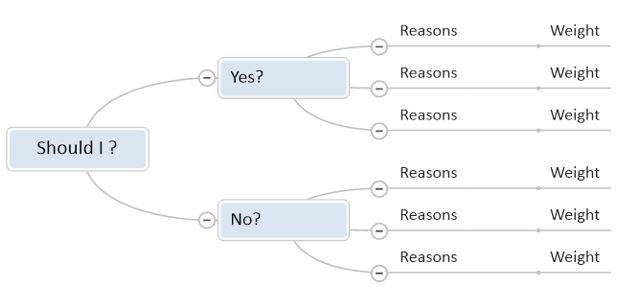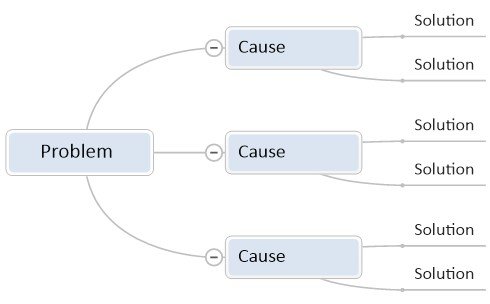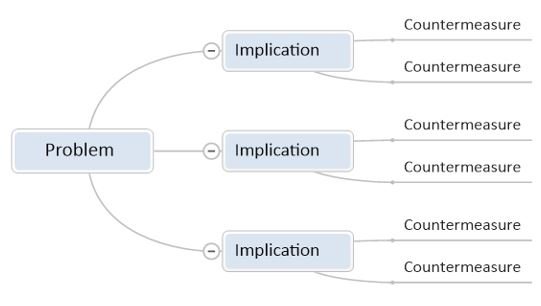How to Make a Good Decision
How to make a good decision
The Quality of our lives is determined by the quality of our decisions.
Decisions. Decisions!
We make decisions every hour of every day. Many decisions are trivial, such as what to eat for lunch, but even these seemingly trivial decisions have a cumulative effect. Other decisions are major, and they have enormous, long term consequences for ourselves and others.
People's lifetime earnings are determined by their ability to make right decisions. People are paid, NOT in proportion to how hard they work, but rather, in proportion to the value of the decisions their organisation will entrust them to make.
Therefore, decision making is one of the most important skills to develop. Here is some guidance on how to make decisions.
1. Yes or No?
2. Which one, What kind? Decisions
3. What is the priority order? Decisions
4. What is the best sequence? Decisions.
5. Problem-cause-solution Decisions.
6. Problem, implication and countermeasure Decisions.
First rule. Make the decision.
Don't procrastinate unnecessarily.
Here is the truth: You must make decisions even in the face of uncertain and incomplete knowledge.
So, the rule to remember is this: After a logical analysis of all the available evidence: Make the decision!
Don't make decisions based upon your first, instinctive, emotional reaction to an event.
Neither should you make a decision based upon any prejudices, nor based upon guesses or fears.
Make your decisions based upon a logical evaluation of all the available evidence in relation to how they affect the achievement of your goal.
In order to think things through logically, use decision matrices. Decision matrices are a great way to make your decisions in a logical way, in writing.
1. Yes or No? Decisions.
You need to make Yes/No decisions all the time.
For example, should you get one, or not?
Should you say it, or not?
should you go on holiday or not?
Should you ask her, or not?
You can handle a yes/no decision by using the following diagram, or try our free Yes/No Decision Making app.

2. Which one, What kind? Decisions
If you are going to get a computer, then which one, what kind?
If you are going on holiday, then which one, what kind?
If you are going to buy a dog, then, which one, what kind?
To help you make this type of decision, try using our Which One, What Kind? Decision making widget.
3. What is the priority order? Decisions
You often need to decide between options, which one is the most valuable?
What is the most valuable use of your time?
What is the most valuable use of your energy?
What is the most valuable use of your effort?
To make a priority order decision, you may find our Job Priority app useful.
4. What is the correct logical sequence? Decisions.
Assume that there is an ideal, most efficient order of steps that will achieve a goal in the most effective manner possible. Ask yourself
What is most efficient order that would achieve the goal in least time and effort?
5. Problem-cause-solution Decisions.
All problems have causes. Most problems have multiple causes.
Name the problem, name the three or four major causes to the problem.
Then assume that each cause suggests a solution.
If you stop the cause, you'll stop the problem.
For example, the three causes of fire are: Heat, oxygen and fuel. If you have enough heat, oxygen and fuel in the same place, then you will have a fire.
If you remove any one of the three causes, then the fire will be extinguished.
Assume the same cause / effect principle applies to all problems.

6. Problem, implication and countermeasure Decisions
All problems may be the cause of additional problems. For example, if you have lost your wallet, then that is a problem.
But having lost your wallet may cause you a number of additional problems, such as credit-card fraud, or not being able to hire a car because your driving licence was in your wallet.
All problems can be the cause of other problems, which need to be anticipated and a set of countermeasures put in place.
Think it through, using this diagram to help you:

Definition: decision matrix
A decision matrix is a simple grid that helps people at work pick the best option. List your choices down the side, list the things that matter across the top, give each thing a weight, score every choice, then add the weighted scores. The option with the highest total is the winner.
Show CG4D Definition
- Displays options and decision criteria in a two-dimensional grid
- Gives each criterion a numerical weight that reflects its importance
- Scores every option against every weighted criterion
- Adds the weighted scores to show the option with the highest total value
Article Summary
Good decision making starts with a clear goal: gather facts, weigh options with a simple decision matrix, set priorities, then act fast and free from bias, because every choice shapes your life, career and team results.
Frequently Asked Questions
Here are some questions that frequently get asked about this topic during our training sessions.
What is a decision matrix and how does it help?
How can I avoid bias when making a decision?
When should I use a yes or no decision tool?
How do I set a priority order among tasks?
Why must I decide even with incomplete information?
What is a problem-cause-solution decision?
How does problem-implication-countermeasure thinking work?
Thought of something that's not been answered?
Did You Know: Key Statistics
McKinsey & Company’s 2024 study on decision speed finds that firms which shorten approval chains are 2.5 times more likely to beat profit targets. Gartner forecasts that by 2025, 70% of large firms will use decision-intelligence tools, up from 10% in 2021.Blogs by Email
Do you want to receive an email whenever we post a new blog? The blogs contain article 5-10 minutes long - ideal for reading during your coffee break!
Further Reading in Decision Making and Problem Solving
-
The Walt Disney Model
Learn how the Disney model turns thinking into action. Switch between Dreamer, Realist and Spoiler roles to solve problems, cut risk and speed decisions.
Read Article > -
What is the Law of Cause and Effect?
Learn the law of cause and effect and use three counter-case questions to test claims, avoid purpose myths and find the real set of causes behind any event.
Read Article > -
Perception Bias in the Workplace
Learn what perception bias is, why it harms teams and how to spot and stop it in recruitment. Use written criteria to cut unconscious bias and hire on fact.
Read Article > -
When and How to Use the Five Whys Technique
Discover how the improved Five Whys technique examines natural law, material, design and intent, so you reach the root cause and prevent repeat faults.
Read Article > -
Tips on How to be Innovative
Learn how to be innovative with 15 practical tips that turn fresh thinking into daily habit. Question rules, link ideas, test fast and find smart answers.
Read Article >
Looking for Leadership and Management Training?
If you're looking to develop your Decision Making and Problem Solving Skills, you may find this Leadership and Management Training Course beneficial:
Open Training Course Pricing and Availability
Next Open Course Starts in 5 days, Bristol (Clifton), places available






